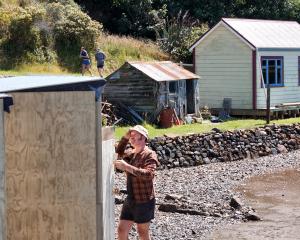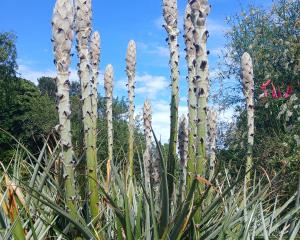
It is easy to feel we’re bearing the world’s climate change woes on our shoulders, losing ourselves in the daily onslaught of negative news without even realising it. Even if we feel we’re not part of the problem (though, of course, we all are), the potential impending armageddon niggles at us just a little bit.
Travel overseas away from our sparsely populated heavenly oasis and very quickly you see the effects of population pressure on the environment. That’s not to dismiss the pressures on our own environment or to give up fighting for positive change.

My daughter has started her own journey as a vegan. Is she part of a growing trend of disempowered youth turning to vegetarianism and veganism as a tool for change? Red meat production creates more climate change gases (including methane from cows belching) than producing the same amount of calories in vegetables. Just another reason to get some of your own veges growing in the backyard, and with a little kitchen magic, transform them into some meat free, home-grown meals.
Growing and buying locally grown food has its own positive multiplier effects on the environment.
To grow yummy fruit and veges, we can look at utilising two of our biggest household resource streams: food scraps and grass clippings. Both seem to multiply at an exponential rate and some people struggle to keep them out of the landfill. For those who use these free resources, there’s a windfall in the garden every week.

I look at my own neglected lawns with a mix of enthusiasm and dread as they keep on growing. I’m almost there, my brain is almost completely rewired to the enthusiasm zone. Grass clippings means making compost or mulching a garden bed or fruit tree. This gets me a step closer to a lusher garden without having to bring in expensive mulches and fertilisers.
My onions this year are testament to my endeavours, a perfect storm of compost, soil life, minerals, water and sunshine. Looking at my pumpkins, I’m not so sure I’m hitting that perfect storm everywhere. Every year is a little different and those pumpkins have time yet to perform this season, fingers crossed.
So let’s get excited by the bucket of food scraps on the bench, and shout for joy when you mow the lawn for what seems like the tenth time this month. Don’t forget to give it a go. All successes, mistakes and disasters are part of the journey.
- The Dr Compost project is funded by Queenstown Lakes District Council and delivered by Wanaka Wastebusters to reduce organic waste going to landfill.
Composting tips
Here are some easy and simple top tips to turn food scraps and lawn clippings into gardening gold.
• Keep it simple. Bury your food scraps in a hole or a trench directly in the garden, preferably in and around food-producing zones; e.g., vege gardens and underneath fruit trees. If you run out of space, you can dig into ornamental beds too.
• Carbon. When building a compost pile, add carbon, carbon and more carbon. Most compost bin and compost pile failures are due to a lack of carbon-rich ingredients, things such as straw, dried grass, shredded cardboard, leaves, prunings from the garden, wood chips, sawdust. It isn’t uncommon for people to chuck only their food scraps in a compost bin, which results in a smelly, sludgy mess. Adding about 50% carbon will make the compost cake break down a whole lot better and without the smell factor.
Surprisingly, making a compost heap out of fresh grass clippings, old dried grass clippings and food scraps will work, because the dried grass clippings supply the carbon needed for a healthy compost heap. Luckily for us most gardens have other materials that can be added to the mix; the more ingredients the better.
• Water. Dig into your compost heap and test the moisture levels: water is often lacking. Pop a cover on open piles so moisture will be recycled within the pile rather than evaporating away. Water the much neglected, wind-affected sides as they dry out first, weekly in the height of summer.
• Glorious free mulch. Use grass clippings as a mulch around ornamental beds and trees. Don’t push the mulch hard up to plants: you don’t want to damage them as the grass decays. Remember weeds grow for a few reasons. One of them is that soil doesn’t like to be naked, so cover up with clippings.
• Yummy eggs. This isn’t for everyone, but everyone is allowed chickens. Create a feeding square: a minimum of one square metre, 10cm deep for two chickens. Fill with wood chips. Feed everything out of your kitchen into this pit. Anything that doesn’t get eaten gets scratched into the wood chips, along with some chicken poop. Once a year dig out the pit and either add it to a compost bin or put it directly on to some vege beds in the autumn, ready for spring planting.
• Bucket list. For free fertiliser from your food scraps, go the bokashi bucket way. It’s a super way of turning food scraps into compost direct in your soil. Right up there in the "too easy to do" awards. Vege gardeners will be blown away by the results. Five-gold-star material.
• Try a worm farm or two. Great when used in combination with another composting system, which will spread the load when those creatues are doing their annual winter slow-down.
• Don’t wage chemical warfare on your lawn. It leaves the lawn clippings useless to use at home and at the compost yard. Lawns aren’t meant to be perfect. Perfection is a story we’ve been sold. Enjoy the diversity of a chemical-free lawn.
Free workshops
Growing vegetables
• Wednesday, March 1, 6-8pm at St John Rooms, 4 Link Way, Wanaka
• Thursday, March 2, 6-8pm at Shotover Garden Centre, Queenstown
Easy Ways to Compost
• Wednesday, March 8, 6-8pm at St John Rooms, 4 Link Way, Wanaka
• Thursday, March 9, 6-8pm at Shotover Garden Centre, Queenstown
Dr Compost will also be giving personalised composting advice at the Queenstown Home Show this weekend.












